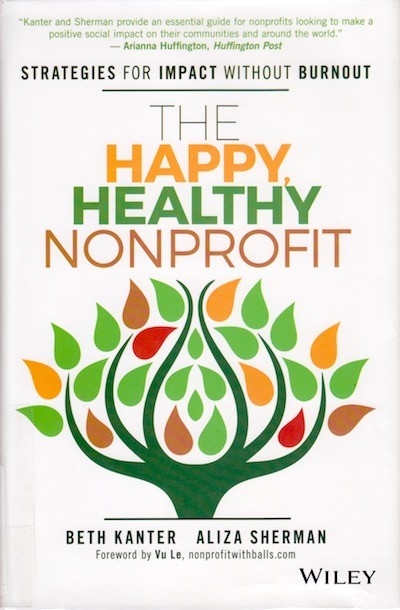- Home
- About Us
- The Team / Contact Us
- Books and Resources
- Privacy Policy
- Nonprofit Employer of Choice Award


A few years ago, I proposed to speak about burnout in the third sector for a session at a not-for-profit conference – the idea was rejected. When I asked the organizers why, they told me no one would show up. Not because there were no others, who like me, were suffering from burnout; rather the subject is taboo and they believed attendees, across the board, would fear exposure and judgment.
We talked about changing the session name, to what, I don’t remember but think it would be catchy to have called it, ‘It’s hard to light a fire under an ass that’s already burnt out’. In the end, we agreed to introduce the topic by putting opportunities for meditation during the conference.
Soon after, I heard there was a book being published that dealt with burnout and focused on creating healthy organizations; The Happy, Healthy Nonprofit: Strategies for Impact Without Burnout, by Beth Kantor and Aliza Sherman. I was so excited and pre-ordered it, waiting impatiently the three weeks until it arrived. I read it in an afternoon. It is not a long book at 200 pages. A professed self-help book junkie, I was familiar with the subject matter and advice offered and think this is a good book for managers looking to improve their organizations and perhaps stem the rate of staff turnover. It also provides diagnostic tools, confirming what one may be feeling and letting them know that they are not alone. However, it may also fall short in providing any real, long-term solutions.
Burnout in the not-for-profit sector has some distinguishing characteristics, most notably the role of volunteers and donors. This aspect needs more attention when assessing the top reasons for burnout, which include feeling you have little or no control over your work, lack of recognition, disconnect between your core values and those of the organization, and feeling unfairly treated in a culture of favoritism.
The book offers tips on coping and reducing stress, however, healing requires more than what is offered and must include a willingness to discover and understand what triggers the negative reactions to situations, not only the circumstances themselves. Somewhat challenging for people who have a history of chronic self-care deprivation tend to be self-sacrificing, carry an overwhelming sense of responsibility and are vulnerable to other people’s opinions of them.
The book has some practical advice on steps to take to avoid and overcome burnout, but take care to understand the spectrum of causes, actual range of time needed to heal and most importantly the potential fallout if the strategies you try to implement fail to personally stick or have employee buy-in.
Kantor and Sherman’s book is part of a developing revolution; the various hashtag movements, including #metoo in the nonprofit sector, are bringing transparency and light to myriad issues, including harassment, neglect and the taboo of admitting burnout.
Buy the book, and then put it in a place where everyone can see it – start the conversation and advance the practice of self-care!
Debbie Dankoff is the Vice President Development, National & Montreal Chapter Director for the Province of Quebec and Ottawa region at the Canadian Friends of the Hebrew University and the "Inspired by Einstein" Project

The Happy, Healthy Nonprofit: Strategies for Impact Without Burnout
Beth Kantor and Aliza Sherman
ISBN: 978-1-119-25111-8
Note - link to book purchase is provided as a service by Hilborn. Hilborn doesn't receive any commission or fees from this.